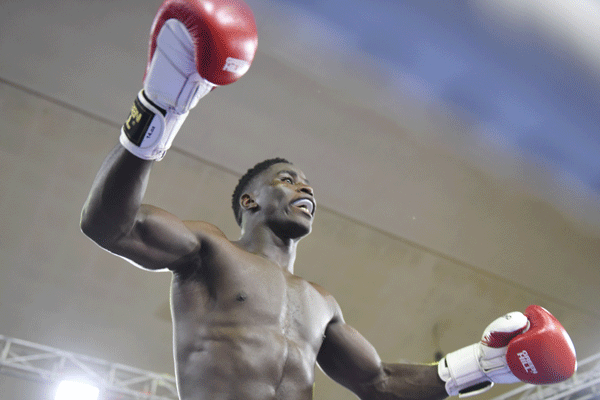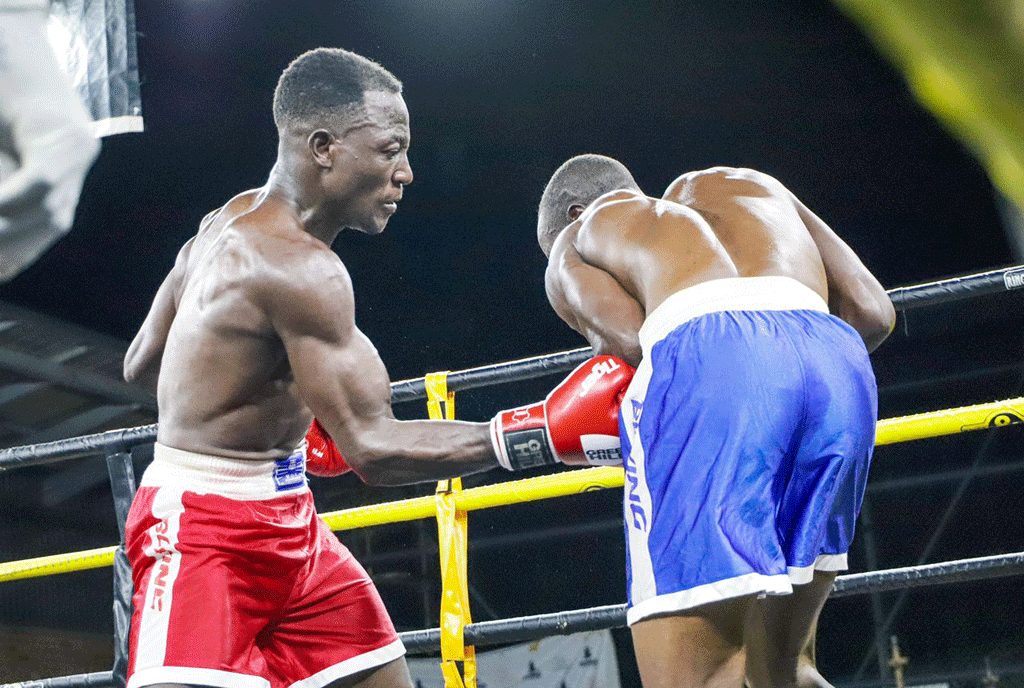Prime
Nkobeza quit violence to be a star

Shoulder-High Celebration. Nakawa’s Nkobeza celebrates his victory over Rashid Igga of Army by RSC (Referee Stopped The Contest) in the first round during their Middleweight 75kgs duel in the Boxing Champions League at Lugogo. PHOTOS / ISMAIL KEZAALA
What you need to know:
- After winning his second pro fight last weekend, Ssemuju admitted Nkobeza is his toughest local rival after 2017 African welterweight champ Muzamiru Kakande.
In January 2020, Joshua Tukamuhebwa told Yusuf Nkobeza that they should start training for the 2022 Commonwealth Games. Nkobeza called it a big joke.
The former schoolmates at Kololo SS and City High School were in the Bombers camp in Luzira Prison as mere sparring partners but both dejected that they wouldn’t travel for the African Olympic Qualifiers in Dakar, Senegal after losing the national trials.
Two years later both are among the six Bombers hoping for glory in Birmingham, with Tukamuhebwa the captain.
Born in Mbulamuti, Kamuli District, Nkobeza grew up in Buikwe near Jinja before joining his auntie in Banda in 2003. During Primary School, he joined notorious slum gangs, where fighting was a way of survival. Gang members nicknamed him “Governor.”
“I regret those gang days,” the quiet-spoken middleweight told me at the Forest Park Resort in Buloba, where the Bombers camped.
Nkobeza often heard his father praising Muhammad Ali and that he was Ugandan. But he was too young to know better.
Finding own way
During holidays in the village, he could break banana trees with punches. “Maybe that’s when my boxing talent began to flash.” But no one cared.
One day, he followed a friend to a boxing coach but again gang fighting pulled him back.
“I was tired of violence but it was hard to break away.”
Finally, around 2014, he found a guide in Frank Sserugo, an amateur boxer. “Why do you want to learn boxing?” Sserugo remembers asking the teenager. “I want to become a champ,” Nkobeza answered, passing the first test.
Had he said he wanted to learn self-defence, Sserugo says he would have turned him away “Because many hide in self-defence to exact revenge; or are ill-tempered and war mongers.”
“That’s why I chased his friend away,” Sserugo recalls, praising Nkobeza as a “well-behaved and focused boy.” They started training lightly, every afternoon Nkobeza returned from Kololo SS.
“Slowly, I pulled away from gang violence,” Nkobeza retells.
Soon, 2015 Sserugo gave Nkobeza the first feel of a boxing fight different from gang stuff. It was an unsanctioned event, aka suicide, on Eid Day in Bweyogere.
“I was delighted by the win and the cash gifts I got from the crowds,” Nkobeza remembers.
Sserugo says Nkobeza is the kind who drops a loaf of bread, a kilo of meat to his first trainer.
Other trainees disappear after a week but Nkobeza was consistent for two years. However, Sserugo lacked resources and handed the boy to Coach Richard Kaziga.
In 2017, Nkobeza had his first national event, the Cadets.
“The coach always told me ‘I want a title’ but I didn’t know what he meant.”
Exuding sheer power, the welterweight stopped two opponents, after his first opponent didn’t turn up. He got silver after losing the final to Wataka. “He swept honours and praise. I envied him and thought: I wasted my chance.”
That made Nkobeza work harder, juggling books and boxing. But his mother wanted her second-born to prioritise academics, like his big brother, a medical doctor in South Africa. “Even now she isn’t my fan. So I want to win a Commonwealth medal, put it around her neck. Maybe then she will convert.”
Late developer
At the 2018 National Intermediates, Nkobeza came with rage and none of his opponents survived the second round.
One of them was Wataka, whom he knocked out in the semi-finals. “Since then he quit boxing.”
That year Nkobeza was meant to focus on his final O’Level exams but in July he went for boxing trials ahead of the East African Games in Burundi.
The underdog made headlines after knocking down Musa Shadir, the then Bombers captain.
“But the judges denied me victory.” His rise stumbled at the 2019 National Open when he lost his first bout to Hamid Daku. “I was complacent and ill-prepared,” he regrets the loss that shattered his dream of going to the African Games in Rabat, Morocco.
Missing Olympics
Nkobeza bounced back in the highly competitive National Olympic Trials in December 2019. In the middleweight decider he faced David Ssemuju, seeded second among African middleweights, after winning silver in Rabat.
Ssemuju was also a prolific, fearless, hard-hitter. Nkobeza had power and fans inside the MTN Arena, Lugogo reminded one another of “the guy from Nakawa Boxing Club, who knocked down Shadir last year.”
It was a war. Rapid shots. Excellent head and body movements. No handling. Typical Ssemuju fight. He will surely outbox you the moment you decide to mix with him. Nkobeza made that mistake, took the punishment, but matched his senior, throughout and could land a killer punch.
Ssemuju won the thriller 4-1 to proceed to the African Olympic Qualifiers in Dakar.
“I won the first round,” Nkobeza claims in the interview. “I think we shared the second or third.”
After winning his second pro fight last weekend, Ssemuju admitted Nkobeza is his toughest local rival after 2017 African welterweight champ Muzamiru Kakande.
Road to Birmingham
Nkobeza joined the Bombers camp at Luzira Prison to help Ssemuju and others prepare for the continental Olympic qualifiers in Dakar, Senegal. That’s when his fellow loser Tukamuhebwa told him about Birmingham 2022. “It didn’t make sense then.” Now it does.
In 2021 Nkobeza was among the three sparring partners for Ssemuju, Shadir and Catherine Nanziri ahead of the Tokyo Olympics. “But I mostly sparred with Shadir; Ssemuju avoided me, which partly explains his bad performance in Tokyo,” Nkobeza says.
Meanwhile, Nkobeza says camping with the seniors sharpened his skills and boosted his confidence. “I started believing I was next in the queue.”
Late September 2021, the federation organised the National Trials, the first amateur event since the pandemic.
Nkobeza wanted a rematch with Ssemuju, who had just returned from the Olympics. But Ssemuju, usually smaller than his opponents, chose the light middleweight division. Instead, it was Shadir who came as a middleweight.
But after the trials, Shadir led the elite boxers who shunned the contracts for the semi-professional Champions League, citing unclear terms of payment. But Nkobeza, eager to enhance his own brand, couldn’t shun the league, the only route to the Commonwealth Games in Birmingham. “
And without the big names, Nkobeza’s ride to Birmingham got smoother. “But I also miss the drive I had while preparing to face the best.” It’s a challenge many boxers and coaches talk about.
From fighting to boxing
Last month, Nkobeza was among the three gold medallists at the Kilimajaro Open in Tanzania—the only tune-up event for the Bombers. “It meant a lot being my first medal in my first tournament outside Uganda; a motivation to seek more glory,” he says.
“We don’t want to be tourists in Birmingham. We need the medals. But first, we must be very competitive.”
To match his competition, Nkobeza talks of changing his style from fighting to boxing. “I must end my obsession with knockouts.”
Whether that’s a masterstroke or a mistake, this week will tell.
Nkobeza has scaled the heights his first trainer can only dream of. “I’m proud of being mentioned in his story,” says Sserugo, now a struggling welterweight with Police BC.
“I pray that God grants him even more success.”




